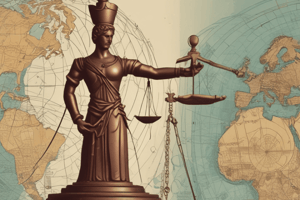Podcast
Questions and Answers
What is a major characteristic of Common Law?
What is a major characteristic of Common Law?
- Legal outcomes are determined exclusively by jury decisions.
- Judges play a significant role in interpreting laws. (correct)
- Laws are primarily based on statutory provisions.
- Laws are uniform across all states in the U.S.
Which of the following is a pro of the Common Law system?
Which of the following is a pro of the Common Law system?
- All laws are legislated without exceptions.
- A clear distinction between all judicial decisions.
- Stare Decisis provides certainty and predictability. (correct)
- Judges are not bound by prior cases.
In which law classification do individuals sue for damages?
In which law classification do individuals sue for damages?
- Civil Law (correct)
- Criminal Law
- Public Law
- Procedural Law
What differentiates Civil Law from Criminal Law?
What differentiates Civil Law from Criminal Law?
What does Substantive Law primarily define?
What does Substantive Law primarily define?
What is a key limitation of the Common Law system?
What is a key limitation of the Common Law system?
Which of the following best describes Public Law?
Which of the following best describes Public Law?
What role do judges have in Civil Law systems?
What role do judges have in Civil Law systems?
What do the scales held by Lady Justice symbolize?
What do the scales held by Lady Justice symbolize?
Why is it important to teach law to business students?
Why is it important to teach law to business students?
What does the Rule of Law ensure?
What does the Rule of Law ensure?
What is a requirement for an efficient market according to the content?
What is a requirement for an efficient market according to the content?
What is the definition of law as stated in the content?
What is the definition of law as stated in the content?
What principle is NOT included in the World Justice Project's definition of Rule of Law?
What principle is NOT included in the World Justice Project's definition of Rule of Law?
What does the concept of property represent in a business context?
What does the concept of property represent in a business context?
What could potentially occur if the Rule of Law is not upheld in businesses?
What could potentially occur if the Rule of Law is not upheld in businesses?
Study Notes
Lady Justice
- Symbolizes legal systems, embodies the concept of justice.
- Balancing scale signifies equality and the importance of checks and balances.
- Represents fairness by hearing both sides of a dispute.
- Blindfold indicates impartiality and the absence of bias.
- Sword symbolizes the enforcement of justice and the power of truth.
Importance of Teaching Law to Business Students
- Establishes essential legal vocabulary for effective communication.
- Enables identification of liabilities, preventing legal troubles for businesses.
- Informs strategic decision-making within a business context.
Efficient Market Requirements
- Law serves as a fundamental foundation for market efficiency.
- Rule of Law ensures equitable legal standards and protection of property rights.
Definition of Law
- Comprises rules established by the state, supported by enforcement agencies (judges, attorneys, police).
- Functions as a crucial social force, establishing order and requiring effective enforcement mechanisms.
Rule of Law
- Laws are applicable to all individuals equally.
- Fosters fairness and peaceful interactions, balancing freedoms and obligations.
- Cultivates public trust in laws, leading to consequences for unlawful actions.
- Essential for a well-functioning market and economic growth; embraced by most wealthy nations.
- Absence of Rule of Law can result in diminished faith in institutions.
World Justice Project Principles on Rule of Law
- Accountability extends to all, including law enforcers.
- Laws must be clear, public, stable, and just.
- Law processes must be accessible, fair, and efficient.
- Justice should be timely, ensuring rights such as a speedy trial.
Property Rights
- Defines exclusionary rights that allow resource control, essential for business operations.
- Promotes resource development and economic incentives, establishing foundations for modern business practices.
Classifications of Law
Common Law vs. Civil Law
-
Common Law:
- Relies on judges' interpretations and precedents in law application.
- Predominantly used in the U.S., with Louisiana as the exception.
- Advantages include concise laws and stable judicial precedents (Stare Decisis).
- Disadvantages feature high volumes of cases and potential conflicting precedents.
-
Civil Law:
- Prioritizes legislation over judicial decisions for law determination.
- Judges do not create law and are not obliged to follow past judicial rulings.
Public Law vs. Private Law
-
Public Law:
- Regulates societal interactions, with the government acting on behalf of society.
- Includes areas such as constitutional, administrative, and criminal law.
-
Private Law:
- Governs private relationships, including property, contract, and tort law.
- Tort law is a civil law form independent of contracts.
Civil Law vs. Criminal Law
-
Civil Law:
- Individual plaintiffs seek damages or appropriate relief through lawsuits.
- Cases often involve breach of contract or torts, with damages as sanctions.
-
Criminal Law:
- Government prosecutes offenders for societal wrongs.
- Sanctions can include severe penalties like imprisonment or fines.
Substantive Law vs. Procedural Law
-
Substantive Law:
- Defines rights and duties in legal relationships among individuals and between individuals and the state.
-
Procedural Law:
- Outlines methods and means for enforcing substantive laws and rights.
- Examples include statutes of limitations and rules governing legal processes.
Studying That Suits You
Use AI to generate personalized quizzes and flashcards to suit your learning preferences.
Description
Explore the fundamental concepts of law as a foundation for business in this quiz. Learn about Lady Justice's symbolism and the importance of legal education for business students. This chapter outlines how understanding law can prevent liabilities and enhance business practices.




